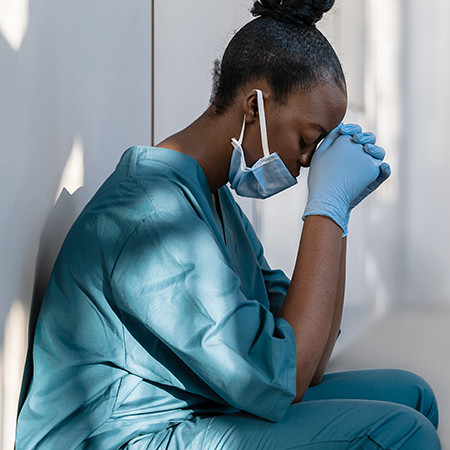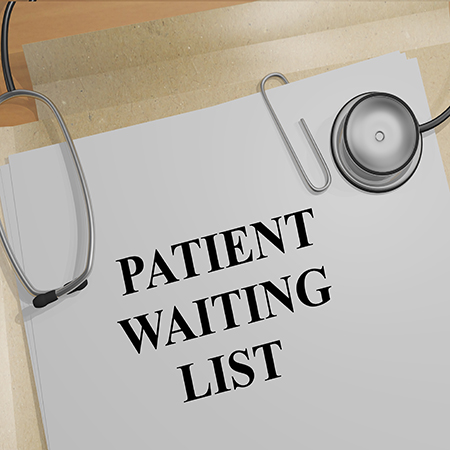The NHS has announced a £160 million initiative to tackle waiting lists and develop a blueprint for elective recovery as early reports show the health service is recovering faster following the second wave of the coronavirus pandemic.
Indicators suggest operations and other elective activity were already at four fifths of pre-pandemic levels in April, well ahead of the 70% threshold set out in official guidance.
That was despite NHS staff still dealing with thousands of Covid patients, having to take additional steps such as infection control measures to keep patients safe, and rolling out the largest vaccination programme in health service history.
NHS England is now seeking to accelerate the recovery by trialling new ways of working in a dozen areas and five specialist children’s hospitals.
The ‘elective accelerators’ will each receive a share of £160 million along with additional support to implement and evaluate innovative ways to increase the number of elective operations they deliver.
Over the next three months, tens of thousands of patients in those areas are set to benefit from initiatives that include a high-volume cataract service, one stop testing facilities, greater access to specialist advice for GPs and pop-up clinics so patients can be seen and discharged closer to home.
Virtual wards and home assessments, 3D eye scanners, at-home antibiotic kits, ‘pre-hab’ for patients about to undergo surgery, AI in GP surgeries and ‘Super Saturday’ clinics - where multi-disciplinary teams come together at the weekend to offer more specialist appointments - will also be trialled.
The aim is to exceed the number of tests and treatments that were being done before the pandemic and develop a blueprint for elective recovery to enable hospitals to go further and faster.
Amanda Pritchard, NHS Chief Operating Officer, says: “With COVID cases in hospitals now significantly reducing thanks to the extraordinary success of the NHS vaccination programme, our focus is now on rapidly recovering routine services. Early figures show local teams are already well ahead of schedule, but we want to go further, faster, which is why we are investing £160 million to find new ways to tackle waiting lists.
“The additional support announced today will help us create a blueprint for continuing that progress over summer and beyond, in a way that doesn’t heap extra pressure on staff, so that as many people as possible benefit from the world-class care the NHS provides.”
The data published this week by NHS England reveals a mixed picture.
The latest waiting figures for elective care hit new record highs once again. At the end of March 2021, 4.95 million people were waiting to start treatment. In addition, the number of people having to wait more than 52 weeks for treatment rose to 436,127 compared with just 3,097 having to wait that length of time in March 2020.
In spite of this, there are signs that services are returning faster than may have been expected.
The NHS has been able to deliver more than 12 million planned operations and procedures, and over 19 million key diagnostic tests, since the beginning of the pandemic.
Despite caring for a far greater number of Covid patients in the second peak, hospitals also maintained high levels of planned care compared to the previous year, and average waiting times for planned surgery have fallen by almost 40% from July 2020.
NHS staff completed almost two million operations and other elective care procedures in the first two months of this year. The number of treatments delivered in January and February was over 800,000, that’s 70% higher than during the height of the first wave.
The emerging data suggests services have already bounced back quicker than they did over last summer, when it took until September to get back to 80% of usual levels of treatment.
The latest statistics also confirm that the NHS saw a record number of people who were referred for urgent cancer checks in March. More than 230,000 with suspected cancer were seen as services started to bounce back after the peak of the second wave of the pandemic over winter.
GPs, specialists and their teams are focusing on those in greatest clinical need and who have been waiting longest.
Other interventions being supported to help NHS teams go further and faster on recovering elective services include:
• North London Partners ICS will extend NHS operating hours, as well as using the independent sector, and offer patients care in newly-designed surgical hubs
• Devon ICS is repurposing the Exeter Nightingale to perform diagnostic tests, and patients in the south west will also benefit from the extension of virtual wards so patients can receive medical support from the comfort of their home, freeing up beds in the process so more patients can be admitted to receive elective care
• Lancashire and South Cumbria ICS is using AI to prioritise and identify the right level of care and support needed for patients on the waiting list.
This investment has been widely welcomed, amid recognition that the challenge that remains to the NHS is immense. Seeking out innovative ways of working and providing appropriate support for patients who are waiting for treatment, along with effective communication should be prioritised now.
Chris McCann, Director of Communications, Insight and Campaigns at Healthwatch, says: “As we move out of the pandemic, the investment into innovation and emphasis on efficiency needs to be coupled with accurate, accessible and personalised communication to those affected. Patients on waiting lists need to be kept informed about next steps for their treatment or care. Additionally, people should know what interim support is available to them and how to access it, especially when it comes to issues such as pain management. Those affected also need to be informed where they are on a waiting list so they have confidence they haven’t been forgotten.”
Whilst tackling the huge backlog is a priority, concern has been expressed from many quarters that the health and wellbeing of NHS staff should also be a priority. Many staff have been working under immense pressure without sufficient time-out for over a year and providers are being urged to enforce essential leave if necessary to avoid compounding the problem in the future due to illness, burnout, or staff leaving the service.
Chris Hopson, Chief Executive of NHS Providers, says: “Trusts are recovering from the pandemic as quickly as possible, prioritising the most urgent cases. Thanks to the dedication of frontline NHS staff they are already ahead of their elective activity targets and have seen a record number of people who were referred for urgent cancer checks in March. This is on top of successfully rolling out the vaccination programme.
“But there is still so much to do to get the NHS back on track, which is particularly hard to plan for when the true long term impact of the pandemic is still emerging.
“A Trust leader told us that, at the moment, for every case they clear, another two referrals come through. While this remains the case the waiting list will continue to grow.”
It’s a sobering thought.











